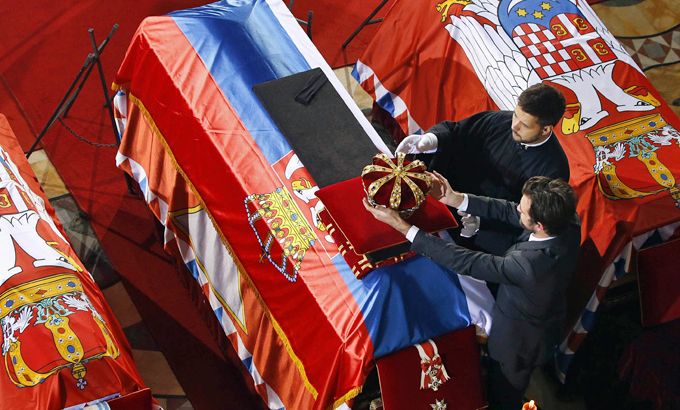Yugoslavia’s last king reburied in Serbia
Funeral with state honours held for Peter II Karadjordjevic, who fled his country at the start of World War Two.

Yugoslavia’s last king has been reburied with state honours in Serbia, more than four decades after he died in the US.
Peter II Karadjordjevic fled his country at the start of World War Two, just days after being proclaimed monarch at the age of 17.
Keep reading
list of 4 itemsPalestinian Prisoner’s Day: How many are still in Israeli detention?
‘Mama we’re dying’: Only able to hear her kids in Gaza in their final days
Europe pledges to boost aid to Sudan on unwelcome war anniversary
The former king’s remains, and those of his wife, mother and brother, were interred in the family tomb at St George church in Oplenac, central Serbia, in a ceremony on Sunday aired live on state television.
The funeral was attended by top state officials, who described it as an act of reconciliation and unity.
After fleeing Yugoslavia during its Nazi occupation, the former king never returned because Communists took over the country at the end of the war and abolished the monarchy.
He died in exile in 1970, aged 47, and was buried at a Serbian Orthodox Church monastery in Libertyville, Illinois.
“We can no longer afford any divisions and injustice,” President Tomislav Nikolic said in a speech at Sunday’s ceremony.
Father assassinated
The third and last king of Yugoslavia, Peter succeeded to the throne in 1934 following the assassination of his father King Aleksandar I in the French city of Marseille.
But as he was only 11 when his father was killed, his uncle Prince Pavle ruled in his stead.
On March 27, 1941, Peter was proclaimed king in a coup staged in opposition to Yugoslavia joining the so-called Tripartite pact signed by Germany, Italy and Japan.
However, he was forced to leave the country with his family only 11 days later as Germany invaded Yugoslavia.
He fled first to Greece, then to Egypt, then to Britain, where he headed the government-in-exile. He later lived in France and ended up in the US.
Hundreds of people, mostly elderly and some dressed in former royal army uniforms, queued to pay their respects to the late monarch.
“Our king was forced to leave, he was forced never to set his foot back to his homeland, but now, finally, he is here where he belongs,” Milka Radojicic, a 78-year old from the nearby town of Topola, said.